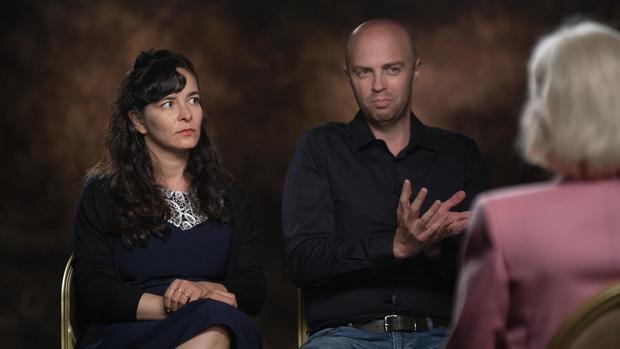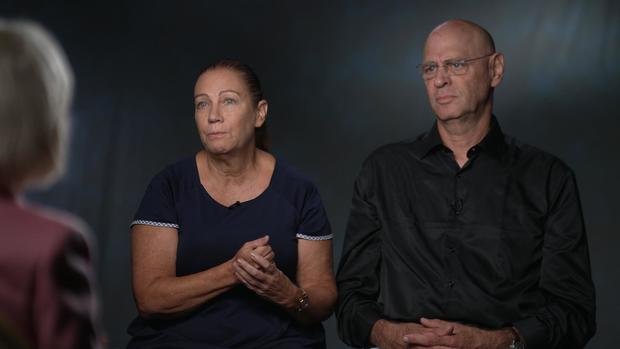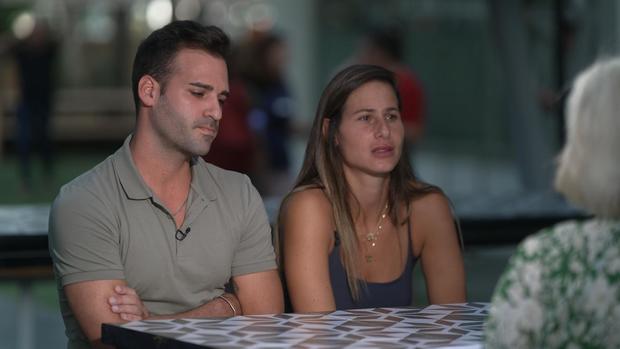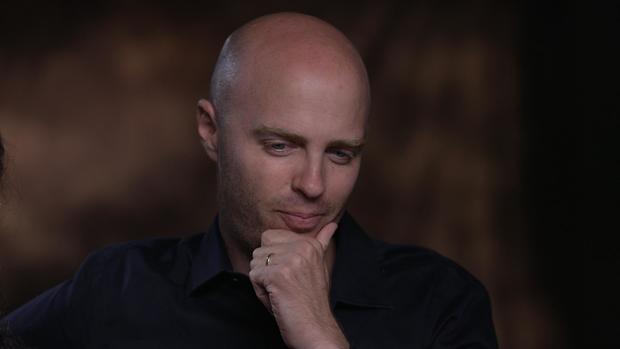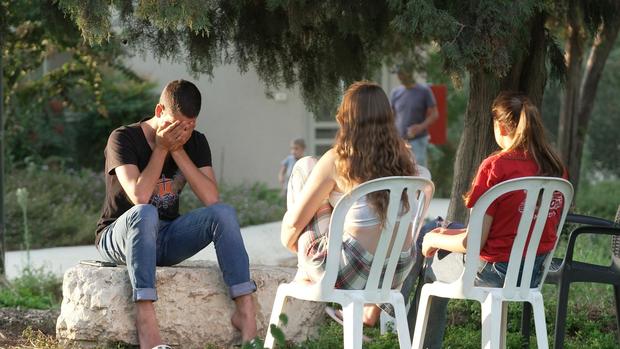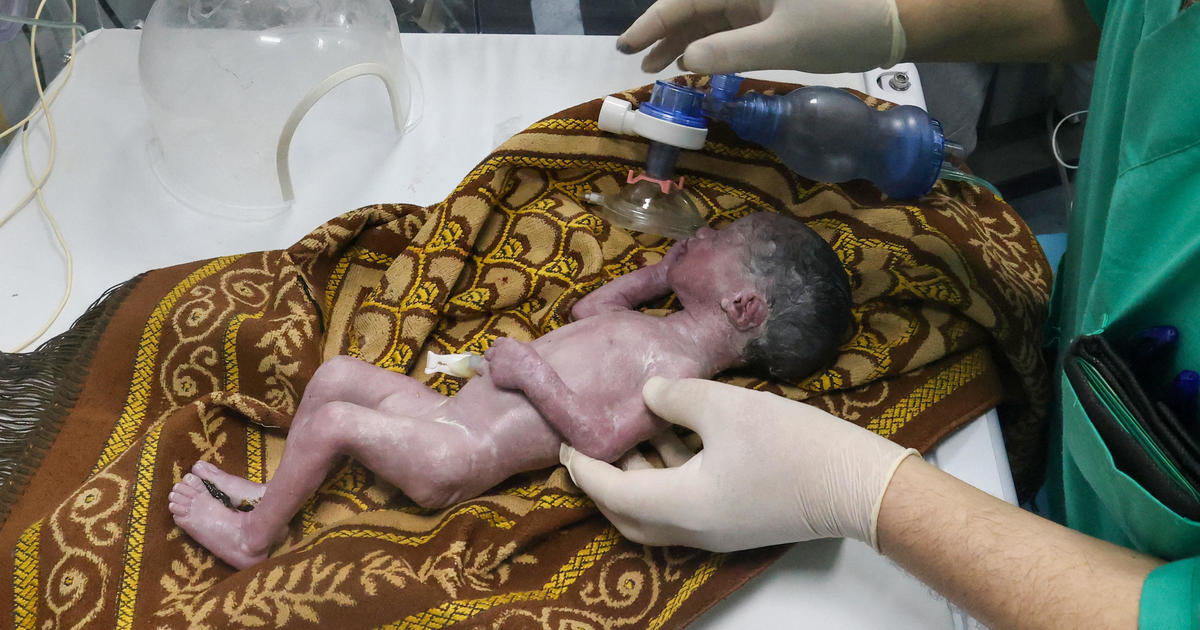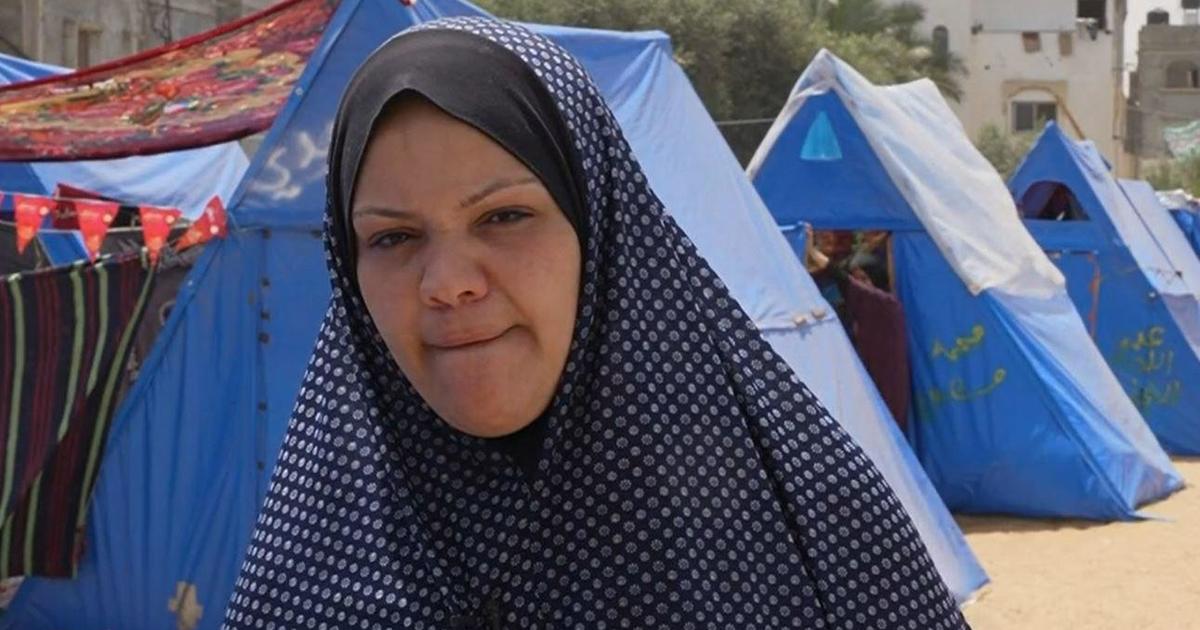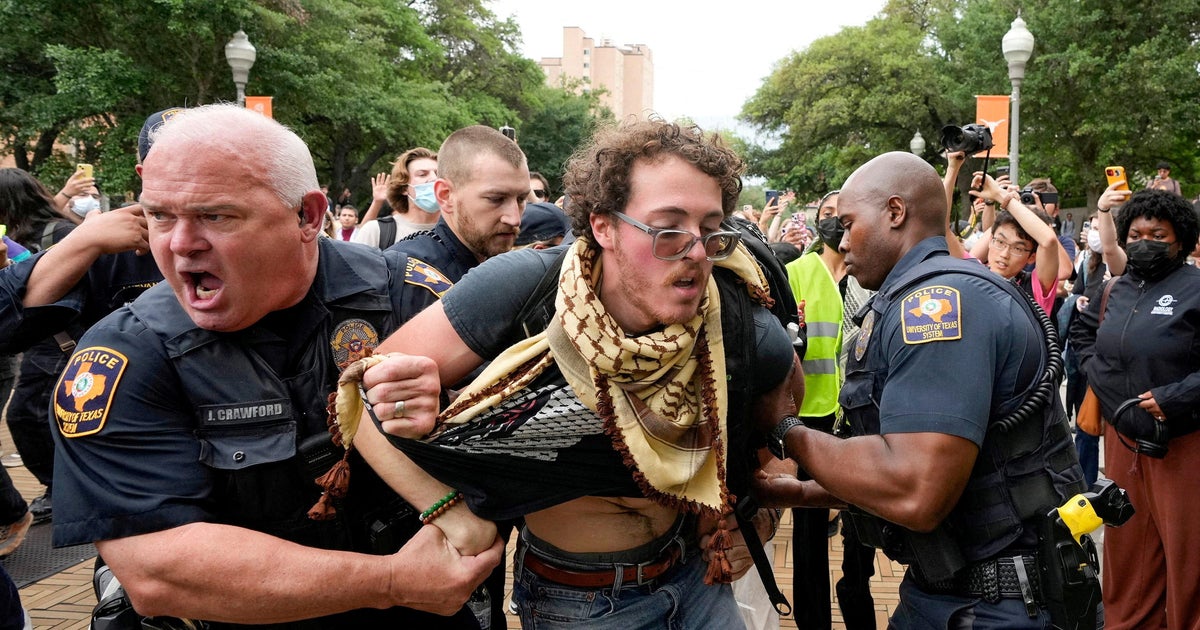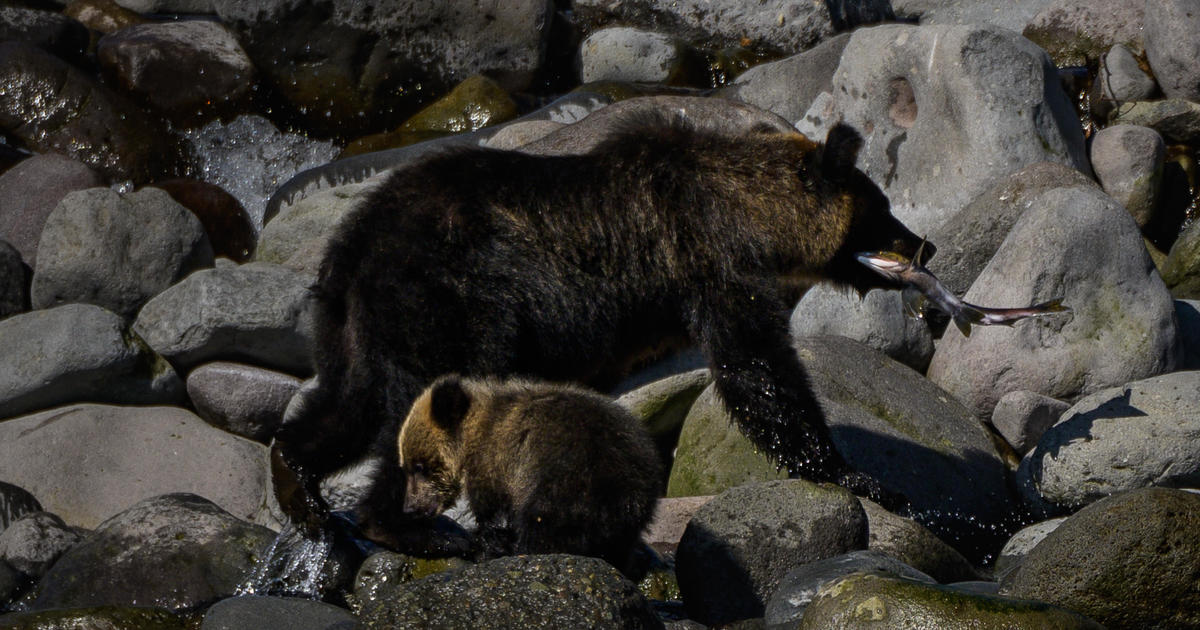Retired IDF major general, wife race to rescue family at Israeli kibbutz during Hamas attack
We're in southern Israel, very close to Gaza. We can hear the mortars going off…it's just a little over a mile away down this road. This area was the hardest hit by Hamas. As you can see behind me…it was almost completely overrun by the surprise invasion.
One of the first places to be infiltrated was Nahal Oz. It's a kibbutz – a small tight-knit agricultural community that's very close by - this way. The population was small, just about 500. People living there used to say it's "a little slice of heaven on the border of hell."
People like, Amir Tibon, a senior correspondent at the left-leaning newspaper Haaretz, and his wife Miri, a social worker, who lived in Nahal Oz with their two small children.
Lesley Stahl: So let's go back to Saturday morning. It's early. It's a beautiful day. 6:00 a.m. you hear something.
Miri Bernovsky-Tibon: I heard the whistle of a rocket. And I'm just like, "Amir, get up." And we just - we ran like crazy into the safe room, which is the girls' bedroom.
Lesley Stahl: Wait, the girls' bedroom is your safe room?
Amir Tibon: This is in every community along the border, in every house there is a room that is built on-- out of special strong concrete. And you call it the safe room because it's supposed to withstand direct attacks from rockets and mortars. Most families, that's where they put the kids to sleep at night. Because then if there's a siren at 6:00 a.m. the parents run to the children and not the other way around. And so we're accustomed to this.
Lesley Stahl: How did you begin to realize it was not going to be a typical rocket attack?
Amir Tibon: It's a moment I will never forget, when we started hearing the automatic gunfire. And we looked at each other and we just both had the same look of horror--
Miri Bernovsky-Tibon: They're here.
Amir Tibon: They're here.
Miri Bernovsky-Tibon: They're here. We heard the Arabic. I'm like, "Amir, they're here."
Lesley Stahl: They were that close?
Amir Tibon: At first it was from the fields of the kibbutz. And then you heard it in the neighborhood. And then you heard it outside our window.
Lesley Stahl: Are they screaming for you to get out of the house? What are they saying?
Amir Tibon: They were not counting on us to get out on our own. They were screaming to each other how to get in.
Videos shot and posted by Hamas, show them shooting up the kibbutz, including this picture of them actually leaning on Amir and Miri's house.
Amir Tibon: They shot ammunition through the living room window, and we just heard that. And it sounded like they're inside the house.
Lesley Stahl: What about these two little girls? Weren't they screaming and crying.
Miri Bernovsky-Tibon: Our girls are so so brave. And we told them: "Girls, we're very, very sorry. But we have to keep quiet."
Lesley Stahl: And they were? At one and three? They were quiet?
Miri Bernovsky-Tibon: For the most of the time, they were.
Amir started texting his colleagues and soon realized the magnitude of the attack.
Amir Tibon: I realized nobody was gonna come. And I called my father. And I said, "This is the situation. You know, the terrorists, maybe they're inside the house, maybe they're outside. We're not sure. All over the kibbutz right now, people are crying for help and nobody's coming. And this-- this may be-- may be it."
Noam Tibon: At that moment we knew that we are going there. I took my— pistol and we went.
Noam Tibon is dad, he's grandpa, and he's a big deal, retired major general who was the senior commander of the Israeli paratroopers and he led forces in the West Bank and at the border with Lebanon.
He and grandma Gali jumped in their jeep in Tel Aviv and started heading south to rescue their family.
Gali Tibon: We were in a situation that there is no government, there is no military, only citizens. And so who else?
While she was driving, the general was texting with his son.
Amir Tibon: So he writes to me, "What's going on?" and I reply, "There are terrorists in the neighborhood." I think also inside the house.
Noam Tibon: I wrote him, "Be quiet, don't move, lock everything."
Amir Tibon: And he asks me if the dog is in the house. And I said, "I don't think he's alive." I thought he was dead because they had fired so much into the house.
Gali drove at top speed until they were stopped at checkpoints and told they could go no further.
Gali Tibon: Then we started to talk to the policemen and say— We have to go. You must let us go." And they were not willing to do that.
Noam Tibon: So we bypass them.
Gali Tibon: Through the fields. We had a jeep.
Noam Tibon: We had a jeep. And then on the next one, we just—we just drove
Lesley Stahl: What?
Gali Tibon: Yeah, they-- they-- they-- they stopped us and I said, "You know what? We are going. It's our son. It's our granddaughters. You want you can shoot me. We are going."
As the grandparents drew closer to the kibbutz, they couldn't believe what they were seeing.
Noam Tibon: We saw things that, you know, you don't see normally. Burning cars, bodies on the road. And then there were a man and a woman running, rushing to us, running. And we stopped. And they said, "Save us."
Lesley Stahl: Save us?
Noam Tibon: Yeah.
Bar and Lior Matsner were escaping the music festival massacre. Thousands were fleeing – some on foot. others, like them, jumped in their cars.
Bar Matsner: He tell me to get down, so I do like this. And he also drive like this. we don't understand anything. We just understand that someone is shootin' our car, and a lot of shoots.
As this dashcam video from another car shows, lots of vehicles were shot at. Bar and Lior's was disabled by bullets, but they were able to escape.
Lior Matsner: There was a forest there and trees. And--
Bar Matsner: A lot of trees, and a lot of--
Lior Matsner: Leaves.
Bar Matsner: --big, dry leaves. So I tell him, "Let's get all these dry leaves and just put on our face, our everything, that they will not see us."
They tried to get help –
Bar Matsner: I call the police. There is no answer. I call the ambulance. There is no answer. And-- like, after two hours or three hours, we don't know--
Lesley Stahl: Two hours? Where are you for two--
Lior Matsner: In this same--
Bar Matsner: In-- in the same--
Lior Matsner: --in the same position--
Bar Matsner: --place.
Lesley Stahl: You're buried under--
Lior Matsner: Yeah.
Lesley Stahl: --a pile of leaves?
Both: Yes.
Eventually they were able to make a run for the road… and spotted the grandparents racing south in the jeep.
Lior Matsner: You just need to understand, Noam and his wife is on their way to his own sons
Bar Matsner: To save his own sons --
Lior Matsner: But they stop and take us with-- they don't know us. They take us to safe zone.
Bar Matsner: Wow. They save our life.
Meanwhile, Amir in their safe room says he could hear neighbors being dragged off. These are pictures of the aftermath in a nearby house… in which – as you can see in this live-streamed Hamas-propaganda video, gunmen were holding that family captive. The father's leg is bleeding. They are now assumed to be hostages in Gaza.
Amir Tibon: The Hamas terrorists, I mean, there were hundreds of them around and inside the kibbutz. The-- the numbers are impossible to comprehend.
Lesley Stahl: There are two kibbutzes near yours, Be'eri, and Kfar Azza. What happened there?
Amir Tibon: In those two communities, hundreds of people were slaughtered. Be'eri and Kfar Azza and the music festival that happened near one of them. Those are the three scenes of the largest massacre of Jewish people since the Holocaust ended.
As the general and Gali got back on the road to the kibbutz, they told us they came upon a group of soldiers, one of whom agreed to join them to help. But because of the danger, they decided to drop Gali off at a roadside shelter -- and pressed on without her.
Amir Tibon: On the road ahead of them they see a military Jeep ambushed by Hamas and several soldiers there are killed and injured. My father and this brave soldier who joined him get out of the car and start fighting. Join the firefight—
Noam Tibon: We basically killed the terrorists there. I killed at least one.
But he faced a dilemma: during the firefight, two Israeli soldiers were wounded and needed to be evacuated to a hospital, and that meant his family would have to wait - again.
Noam Tibon: Otherwise they they will bleed to death. So I said, Okay, I'm taking them, you know, because no way that they are going to die d-- die there. Okay.
Amir Tibon: This is the second time that morning that my parents are getting closer to us and they turn around to help someone else. They take the wounded soldiers to where my mother is.
And she took the wounded to a hospital, while the general happened upon an old army buddy – another grandfather – and they headed back to rescue his son's family.
Lesley Stahl: So where were the police? Where was the military? Why did a grandfather have to go to rescue you?
Miri Bernovsky-Tibon: That's a very good question, Lesley. I hope all of Israel is asking this question.
Amir Tibon: It's the biggest failure in the history of the state of Israel. Civilians by the hundreds were being massacred by terrorists and nobody came. I've never been more proud -- (chime)
Announcer: This is a security announcement. Please proceed directly to the closest shelter on your floor
An alert: rocket fire over Tel Aviv.
Lesley Stahl: We are in-- on the bottom floor--
Amir Tibon: We're in-- we're in a safe place here.
Miri Bernovsky-Tibon: We're underground.
Amir Tibon: We're underground. We're OK.
We were struck by how calm they were… given what they went through just days ago, as they waited hours for dad. But once dad finally got to the kibbutz, before he went to Amir's he joined a group of Israeli special forces, and went house to house with them, methodically clearing out the terrorists.
Lesley Stahl: At that point-- Hamas was in control obviously of this kibbutz? They were-- they'd occupied it?
Noam Tibon: Basically, the Hamas was in control. And the-- you know, we start to get in. And we saw bodies. Some of them terrorists, some Israelis. On this situation, you have to-- to work very, very focus. Okay, you have to clean one house, and then go to the next house, and then go to the next house because if you run too fast, they will shoot you from the behind. And it takes time.
Amir Tibon: We are, at that point, still stranded in the safe room. We have no cell phone by that point. We don't know where my father is, but we begin to hear very close exchanges of gunfire.
Lesley Stahl: How many hours, by that point, had you been in the safe room?
Amir Tibon: By now, it's, I think, eight, nine hours that we're inside? No electricity, no food, two girls that are the biggest heroes in the world, keeping quiet.
Then -- at 4 o'clock, after an hour of door-to-door combat, the retired general finally reached their house.
Noam Tibon: I went straight to the window of this armor room when-- when they were hiding. I knock on the window and I said, "Amir, it's Dad."
Amir Tibon: And we hear my father's voice. He says something like you know "Open. Open." And Galia, our older daughter, she says, "Saba Higiya." Grandfather is here. (sigh) And that's-- that's the first time we started crying.
For now, Amir, Miri, and the girls are living with the grandparents in Tel Aviv. As is the dog! Many other survivors of Nahal Oz were evacuated to another kibbutz in the north.. having buried at least 10 of their dead. They're still looking for more than 10 who are missing, presumed to be hostages.
Produced by Shachar Bar-On and Jinsol Jung. Associate producer, Collette Richards. Broadcast associate, Wren Woodson Edited by Peter M. Berman.
